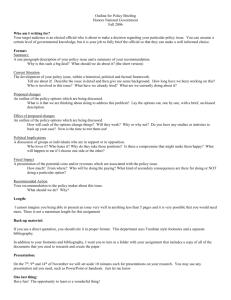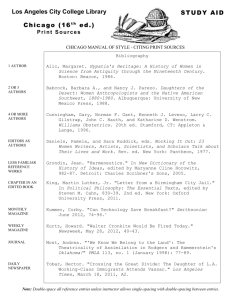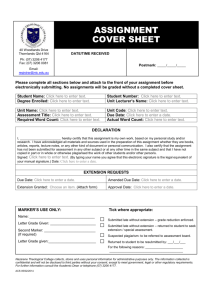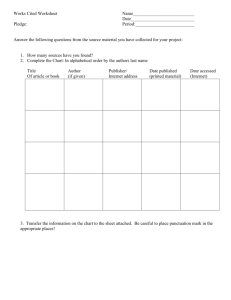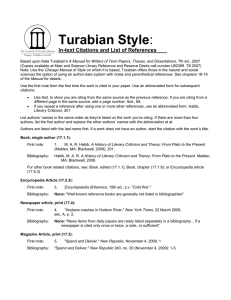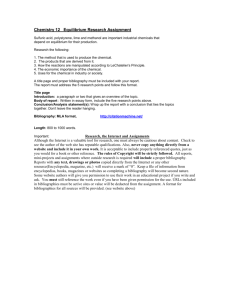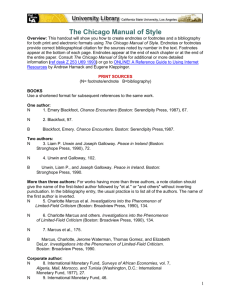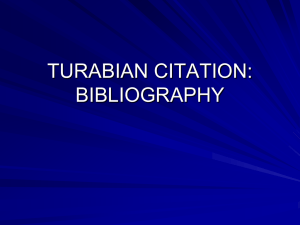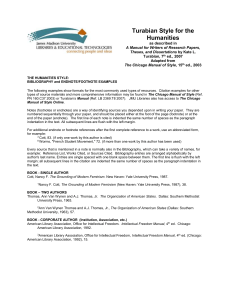Turabian and Chicago Styles Citations
advertisement
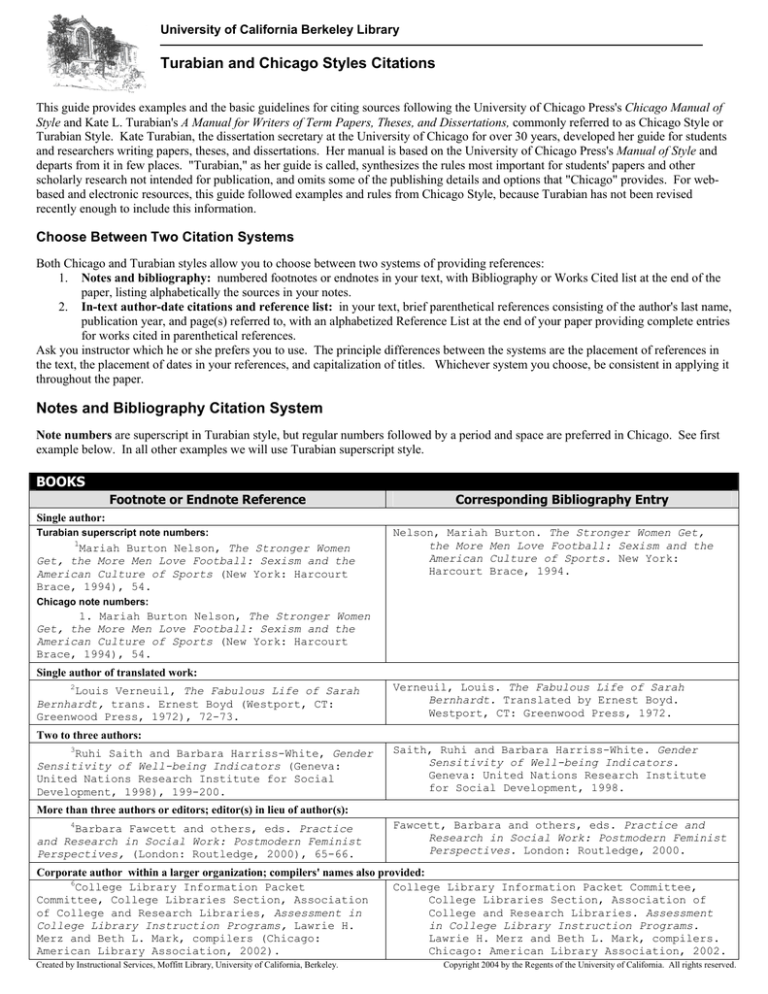
University of California Berkeley Library Turabian and Chicago Styles Citations This guide provides examples and the basic guidelines for citing sources following the University of Chicago Press's Chicago Manual of Style and Kate L. Turabian's A Manual for Writers of Term Papers, Theses, and Dissertations, commonly referred to as Chicago Style or Turabian Style. Kate Turabian, the dissertation secretary at the University of Chicago for over 30 years, developed her guide for students and researchers writing papers, theses, and dissertations. Her manual is based on the University of Chicago Press's Manual of Style and departs from it in few places. "Turabian," as her guide is called, synthesizes the rules most important for students' papers and other scholarly research not intended for publication, and omits some of the publishing details and options that "Chicago" provides. For webbased and electronic resources, this guide followed examples and rules from Chicago Style, because Turabian has not been revised recently enough to include this information. Choose Between Two Citation Systems Both Chicago and Turabian styles allow you to choose between two systems of providing references: 1. Notes and bibliography: numbered footnotes or endnotes in your text, with Bibliography or Works Cited list at the end of the paper, listing alphabetically the sources in your notes. 2. In-text author-date citations and reference list: in your text, brief parenthetical references consisting of the author's last name, publication year, and page(s) referred to, with an alphabetized Reference List at the end of your paper providing complete entries for works cited in parenthetical references. Ask you instructor which he or she prefers you to use. The principle differences between the systems are the placement of references in the text, the placement of dates in your references, and capitalization of titles. Whichever system you choose, be consistent in applying it throughout the paper. Notes and Bibliography Citation System Note numbers are superscript in Turabian style, but regular numbers followed by a period and space are preferred in Chicago. See first example below. In all other examples we will use Turabian superscript style. BOOKS Footnote or Endnote Reference Corresponding Bibliography Entry Single author: Turabian superscript note numbers: 1 Mariah Burton Nelson, The Stronger Women Get, the More Men Love Football: Sexism and the American Culture of Sports (New York: Harcourt Brace, 1994), 54. Nelson, Mariah Burton. The Stronger Women Get, the More Men Love Football: Sexism and the American Culture of Sports. New York: Harcourt Brace, 1994. Chicago note numbers: 1. Mariah Burton Nelson, The Stronger Women Get, the More Men Love Football: Sexism and the American Culture of Sports (New York: Harcourt Brace, 1994), 54. Single author of translated work: 2 Louis Verneuil, The Fabulous Life of Sarah Bernhardt, trans. Ernest Boyd (Westport, CT: Greenwood Press, 1972), 72-73. Verneuil, Louis. The Fabulous Life of Sarah Bernhardt. Translated by Ernest Boyd. Westport, CT: Greenwood Press, 1972. Two to three authors: 3 Ruhi Saith and Barbara Harriss-White, Gender Sensitivity of Well-being Indicators (Geneva: United Nations Research Institute for Social Development, 1998), 199-200. Saith, Ruhi and Barbara Harriss-White. Gender Sensitivity of Well-being Indicators. Geneva: United Nations Research Institute for Social Development, 1998. More than three authors or editors; editor(s) in lieu of author(s): 4 Barbara Fawcett and others, eds. Practice and Research in Social Work: Postmodern Feminist Perspectives, (London: Routledge, 2000), 65-66. Fawcett, Barbara and others, eds. Practice and Research in Social Work: Postmodern Feminist Perspectives. London: Routledge, 2000. Corporate author within a larger organization; compilers' names also provided: 6 College Library Information Packet Committee, College Library Information Packet College Libraries Section, Association of Committee, College Libraries Section, Association College and Research Libraries. Assessment of College and Research Libraries, Assessment in in College Library Instruction Programs. College Library Instruction Programs, Lawrie H. Lawrie H. Merz and Beth L. Mark, compilers. Merz and Beth L. Mark, compilers (Chicago: Chicago: American Library Association, 2002. American Library Association, 2002). Created by Instructional Services, Moffitt Library, University of California, Berkeley. Copyright 2004 by the Regents of the University of California. All rights reserved. Page 2 of 6 pages BOOKS Footnote or Endnote Reference Corresponding Bibliography Entry Undated work also lacking publisher information; and single corporate author: 7 Black Panther Party. Rules (Oakland, Black Panther Party. Rules. Oakland, California, California, n.d.). n.d. ARTICLES IN PERIODICALS (Journals, Magazines, Newspapers, Book Reviews) Footnote or Endnote Reference Corresponding Bibliography Entry Treat authors, multiple authors, editors, translators, and corporate authors the same as books (above). Journal with pages numbered consecutively throughout a volume or year: 8 McCammon, Holly J. "'Out of the Parlors and on to Holly J. McCammon, "'Out of the Parlors and the Streets': The Changing Tactical on to the Streets': The Changing Tactical Repertoire of the U.S. Women's Suffrage Repertoire of the U.S. Women's Suffrage Movements." Social Forces 81 (2003): 787Movements." Social Forces 81 (2003): 787-818. 818. Pagination restarts with each issue within a volume: 9 Don Mitchell, "Iconography and Locational Conflict from the Underside: Free Speech, People's Park, and the Politics of Homelessness in Berkeley," Political Geography 11, no. 2 (1992): 152-169. 10 Laurie Moses Hines, "When Parallel Paths Cross: Competition and the Elimination of Sex Segregation in the Education Fraternities, 19691974," History of Education Quarterly 43 (Summer 2003): 199-200. Mitchell, Don. "Iconography and Locational Conflict from the Underside: Free Speech, People's Park, and the Politics of Homelessness in Berkeley." Political Geography 11, no. 2 (1992): 152-169. Hines, Laurie Moses. "When Parallel Paths Cross: Competition and the Elimination of Sex Segregation in the Education Fraternities, 1969-1974." History of Education Quarterly 43 (Summer 2003): 196-223. Magazines of general interest (issue date used in lieu of volume/issue numbers): 11 Nakashima, T. "Concentration Camp: U.S. Style," T. Nakashima, "Concentration Camp: U.S. New Republic, 15 June 1942, 822-23. Style," New Republic, 15 June 1942, 822. Daily Newspaper articles: 12 "Q&A: Amanda E. Lewis: Stanford Fellow Investigates 'The Fourth R'," San Francisco Chronicle, 5 March 2004, E3. News items from daily newspapers are rarely listed in a bibliography or reference list, unless the newspaper is referred to several times and constitutes a substantial part of the documentation. Non-daily Newspaper and Newsletter articles: 13 Liz McMillen, "Gender-bending Hyenas," Chronicle of Higher Education, 3 May 1996, A13. McMillen, Liz. "Gender-bending Hyenas." Chronicle of Higher Education, 3 May 1996, A12-A13. Book Review article: 14 Francille M. Firebaugh, review of The Academic Kitchen: A Social History of Gender Stratification at the University of California, Berkeley, by Maresi Nerad, Isis 92 (March 2001): 237. Firebaugh, Francille M. Review of The Academic Kitchen: A Social History of Gender Stratification at the University of California, Berkeley, by Maresi Nerad. Isis 92 (March 2001): 236-37. CHAPTERS IN BOOKS Footnote or Endnote Reference Corresponding Bibliography Entry Treat authors, multiple authors, editors, translators, and corporate authors of chapters the same as authors of books (above). Editors of the collection of chapters are listed after the book title, with "edited by" abbreviated to: ed. 15 Zakin, Emily. "Beyond the Sexual Contract: Emily Zakin, "Beyond the Sexual Contract: Traversing the Fantasy of Fraternal Traversing the Fantasy of Fraternal Alliance," in Alliance." In Between the Psyche and the Between the Psyche and the Social: Psychoanalytic Social: Psychoanalytic Social Theory, ed. Social Theory, ed. Oliver Kelley and Steve Edwin Oliver Kelley and Steve Edwin, 159-83. (Lanham, MD: Rowman and Littlefield, 2002), 161. Lanham, MD: Rowman and Littlefield, 2002. Page 3 of 6 pages ONLINE ARTICLES (Journals, Magazines, Newspapers, Book Reviews) Footnote or Endnote Reference Corresponding Bibliography Entry As much as possible, try to identify and provide elements equivalent to those used for print publications, above. Journal article - online version identical to print (provide page numbers if available; omit if not): 14 Sanbonmatsu, Kira. "Gender Stereotypes and Vote Kira, Sanbonmatsu, "Gender Stereotypes and Choice." American Journal of Political Vote Choice," American Journal of Political Science 46 (2002): 20-34, Science 46 (2002), 21-22, http://www.jstor.org/view/00925853/ http://www.jstor.org/view/00925853/ sp030001/03x0054b/0#&origin=sfx%3Asfx sp030001/03x0054b/0#&origin=sfx%3Asfx (accessed (accessed March 22, 2004). March 22, 2004). Journal article - different from print version or only online publication - without page numbers: 15 Erez, Edna. "Domestic Violence and the Criminal Edna Erez, "Domestic Violence and the Justice System: An Overview." Online Journal Criminal Justice System: An Overview," Online of Issues in Nursing 7, no. 1 (January Journal of Issues in Nursing 7, no. 1 (January 2002), http://www.nursingworld.org/ojin/ 2002), http://www.nursingworld.org/ojin/ topic17/tpc17_3.htm (accessed March 22, topic17/tpc17_3.htm (accessed March 22, 2004). 2004). Online magazine article: 16 Eric Boehlert, "Watch Your Mouth," Salon, March 19, 2004, http://www.salon.com/news/feature/2004/03/19/fcc/ (accessed March 22, 2004). Boehlert, Eric. "Watch Your Mouth." Salon, March 19, 2004, http://www.salon.com/news/feature/2004/03/1/ fcc/ (accessed March 22, 2004). Newspaper article online: 17 Tanya Schevitz, "Berkeley Parents Reinvent School: Charter Program to Focus on Ability Rather Than Age," San Francisco Examiner, January 18, 1995, Wednesday; fourth edition, http://web.lexisnexis.com/universe/ document?_m=5b81f9bb972aef2e8ed34751f6d3002f&_docn um=16&wchp=dGLbVlbzSkVA&_md5=a7ced40274280aa4a3ac6bed4cd2a53a (accessed March 22, 2004). News items from daily newspapers are rarely listed in a bibliography or reference list, unless the newspaper is referred to several times and constitutes a substantial part of the documentation. Online Book Review article - online without print equivalent: 18 Jay MacDonald, "Fantastic Voyage: Jasper Fforde Takes Readers on a Witty, Wild Ride," review of The Well of Lost Plots, by Jasper Fforde, BookPage: America's Book Review (2004), http://www.bookpage.com/0403bp/jasper_fforde.html (accessed March 22, 2004). MacDonald, Jay. "Fantastic Voyage: Jasper Fforde Takes Readers on a Witty, Wild Ride." Review of The Well of Lost Plots, by Jasper Fforde. BookPage: America's Book Review (2004), http://www.bookpage.com/0403bp/ jasper_fforde.html (accessed March 22, 2004). Online Book Review article - print equivalent, found in another online resource: 19 Phillips, Jayne Anne. "Crowding Out Death." Jayne Anne Phillips, "Crowding Out Death," Review of White Noise, by Don DeLillo. New review of White Noise, by Don DeLillo, New York York Times Book Review, January 13, 1985. Times Book Review (January 13, 1985), http://galenet.galegroup.com/servlet/LitRC?l http://galenet.galegroup.com/servlet/LitRC?locID=u ocID=ucberkeley&frmhyp=1&srchtp=athr&c=2&PN= cberkeley&frmhyp=1&srchtp=athr&c=2&PN=CLC0218DOC02 CLC0218DOC02205&ai=23406&svdste=6&docNum=H11 205&ai=23406&svdste=6&docNum=H1102180000&ST=don+de 02180000&ST=don+delillo&bConts=16303&vrsn=3& lillo&bConts=16303&vrsn=3&OP=contains&ca=1&ste=120 OP=contains&ca=1&ste=120&tab=1&tbst=arp&n=10 &tab=1&tbst=arp&n=10 (accessed March 22, 2004). (accessed March 22, 2004). ONLINE BOOK Footnote or Endnote Reference Corresponding Bibliography Entry As much as possible, try to identify and provide elements equivalent to those used for print publications, above. Online reproduction of previously published book: 20 Emma Hardinge Britten, Modern American Spiritualism: A Twenty Years' Record of the Communion Between Earth and the World of Spirits (New York: The Author, 1870): 57, Making of America Collection, http://www.hti.umich.edu/cgi/t/text/ text-idx?c=moa;idno=ACM3377 (accessed March 22, 2004). Britten, Emma Hardinge. Modern American Spiritualism: A Twenty Years' Record of the Communion Between Earth and the World of Spirits. New York: The Author, 1870. Making of America Collection, http://www.hti.umich.edu/cgi/t/text/ text-idx?c=moa;idno=ACM3377 (accessed March 22, 2004). Page 4 of 6 pages WEBSITES and WEB PAGES Footnote or Endnote Reference Corresponding Bibliography Entry Insofar as possible, apply the rules and conventions for print materials to web pages and websites. When in doubt supply information that will help readers locate the website and the passage you refer to. For note brevity, some details may appear only in the bibliography. Website with authors, title, series, publisher, and date (no page numbers): 8 Roosevelt, Eleanor. "To Undo a Mistake Is Always Eleanor Roosevelt, "To Undo a Mistake Is Harder Than Not to Create One Originally." Always Harder Than Not to Create One Originally," Chapter 2 ("Essay") in Confinement and chapter 2 ("Essay") in Confinement and Ethnicity: Ethnicity: An Overview of World War II An Overview of World War II Japanese American Japanese American Relocation Sites, by J. Relocation Sites (U.S. Department of the Interior, Burton and others, Publications in National Parks Service, Western Archeological and Anthropology 74. U.S. Department of the Conservation Center, 1999, revised 2000), Interior, National Parks Service, Western http://www.cr.nps.gov/history/online_books/ Archeological and Conservation Center, 1999, anthropology74/ce2.htm (accessed March 22, 2004). (revised 2000), http://www.cr.nps.gov/history/online_books/ anthropology74/ce2.htm (accessed March 22, 2004). Web page within a website; not dated: 9 Free Speech Movement Archives, "Mario Savio's Speech Before the FSM Sit-in" [conclusion], (Berkeley: FSM-A, n.d.), http://www.fsm-a.org/stacks/mario/ mario_speech.html (accessed March 22, 2004). Free Speech Movement Archives. "Mario Savio's Speech Before the FSM Sit-in" [conclusion]. Berkeley: FSM-A, n.d. http://www.fsm-a.org/ stacks/mario/mario_speech.html (accessed March 22, 2004). ___________________________________________________________________________________________________ In-Text Author-Date Parenthetical Citations and Reference List System Most of the rules and examples for notes and bibliographies also apply using this system. Instead of footnotes or endnotes, provide the page(s) quoted or referred to in brief parenthetical references based on the author's last name and date of publication. After the body of your paper, you must also provide an alphabetized reference list. Format of In-Text Author-Date Citations The in-text citations are always enclosed in parentheses, and are composed of three elements: 1. The first element consists of last name(s) of one, two or three authors. Use "and others" for more than three authors, as for notes and bibliographies. If a work has no author, use the first words of the title in the parenthetical reference and as the initial element in the reference list. 2. Follow the first element by the year of publication, separated from the first element only by a space. 3. Follow the year by a comma, a space, and then the page or pages you are quoting or referring to. Omit for works lacking pagination. Format of Reference List Entries Except as noted here, reference lists are organized following the same rules as bibliographies: 1. The beginning of each reference list entry must correspond to the first name or title word used in your in-text citations. This is to permit your reader to quickly find each matching complete reference in the list. 2. The year of publication follows the author(s) or title (only if no author), and must match the year used in parenthetical references. The year is not repeated later in the reference as part of the publication information. Other date elements (months, days) are left unchanged from the form used in bibliographies. 3. In titles and sub-titles of works, capitalize only the first letter and proper names (sentence case). In journal titles, capitalize all significant words (title case). EXAMPLES In-Text Parenthetic Reference Corresponding Reference List Entry Single author - book: Your text here (Nelson 1994, 54). Nelson, Mariah Burton. 1994. The stronger women get, the more men love football: Sexism and the American culture of sports. New York: Harcourt Brace. Page 5 of 6 pages EXAMPLES In-Text Parenthetic Reference Corresponding Reference List Entry Two or three authors - book: Your text with "A quoted passage" (Saith and HarrissWhite 1998, 199-200). Saith, Ruhi and Barbara Harriss-White. 1998. Gender sensitivity of well-being indicators. Geneva: United Nations Research Institute for Social Development. Periodical article: Your text your want to refer to is here (Hines 2003, 199-200), and you continue the sentence. Hines, Laurie Moses. 2003. "When parallel paths cross: Competition and the elimination of sex segregation in the education fraternities, 1969-1974." History of Education Quarterly 43 (Summer): 196-223. Online article, no page numbers: Your text here (Boehlert 2004). Boehlert, Eric. 2004. "Watch your mouth." Salon, March 19, http://www.salon.com/news/feature/ 2004/03/19/fcc/ (accessed March 22, 2004). Daily Newspaper articles: Your text giving the "Title of the Article" here (San Francisco Chronicle, 5 March 2004, E3). News items from daily newspapers are rarely listed in a bibliography or reference list, unless the newspaper is referred to several times and constitutes a substantial part of the documentation. Therefore, provide in your text and parenthetic reference enough information to identify the source clearly. No author. Title used in lieu of author. Electronic resource, no date or page numbers: Your text or "quoted passage" (Free Speech Movement Archives, n.d.). Free Speech Movement Archives. N.d. "Mario Savio's Speech Before the FSM Sit-in" [conclusion]. Berkeley: FSM-A, http://www.fsm-a.org/ stacks/mario/mario_speech.html (accessed March 22, 2004). Chicago and Turabian Style Rules Governing the Examples Above The general Chicago and Turabian Style rules for the above are based are listed here: • • • • • • • • • General. List the elements that clearly identify the work's author and title, its publisher, and date of publication.. For online publications, add elements stating where you retrieved the document and the date accessed, if required. Punctuation. Periods are generally used between elements in references in bibliographies and reference lists. A colon separates titles from subtitles, the place of publication from the publisher name, and volume information from page numbers for journal articles. Quotation marks are used around article and chapter titles. Capitalization. In bibliographies and notes, capitalize the first letter of all significant words in titles and subtitles of works and parts of works such as articles or chapters. In reference lists, capitalize the first letter of all significant words only in titles of periodicals, and capitalize only the first letter of the first word (and any proper nouns) of titles and subtitles of articles, books, and chapters, and corporate authors. Font. Italicize titles of periodicals and books. Abbreviations. Use ed. or trans. for "editor" or "edited by" or "translator" or "translated by." "University" may be abbreviated to Univ. Months may be abbreviated. Be consistent throughout your paper with whatever conventions you adopt. Footnotes and endnotes. Number notes consecutively throughout your paper, beginning with one. Format is the same for endnotes and footnotes. Endnotes should follow the body of the paper and precede any appendices and the bibliography. In Turabian style, use superscript 1 for endnote and footnote numbers in the text and at the beginning of each note. In Chicago style, the note number in the text is in parentheses(1)and is followed by a period and space in the note: 1. Note content. Authors' names. In bibliographies and reference lists, only the first author's last name is inverted (last name first). First names should usually be provided when available. List all authors' names in a bibliography or reference list. In in-text parenthetical references, list the last names of one to three authors; if more than three, list the first followed by et al. Corporate names as authors are written out. Publication place. If more than one place is given, the first is generally sufficient. Do not abbreviate place names. Give the city and state or country if the city is not well known for publishing or is ambiguous. Publisher. Provide the exact publisher name. Common names may be shortened (e.g., Scribner, Macmillan). Page 6 of 6 pages • • • Publication date. In notes and bibliographies, the date of publication for books and most published works follows the publisher name. For articles, it is part of the volume and issue number statement (below). In reference lists, the year of publication immediately follows the name(s) of the author(s). For works with no author or editor, put the title first and follow it by the year of publication. If there is no date available, state: n.d. Volume and Issue Numbers. For periodicals with continuous pagination throughout a volume, provide only the volume number and year. If issue begins with page 1, follow the volume number with the issue number identified by "no." or its name: 38, no. 2 (1993): 12-17. Electronic resources. Follow rules that apply to equivalent parts of print resources as much as possible. When in doubt, avoid italics and quotation marks and give as much information as may be useful. Too much is better than too little. o Authors of web pages. If not readily apparent, try to find and provide the name(s) of authors or corporate author(s) responsible for the content. The objective is to attribute the content and to tell you reader who provided the information. It is better to explain web pages without apparent authorship than to provide insufficient information, leaving your reader wondering. o URL. Always provide the URL if web-based. Break URLs only after a /. o Dates for electronic resources. Include if required by your instructor. Otherwise, omit dates accessed except for sites frequently updated, sites where the content is known not to be permanent (most news and magazine sites), and timesensitive data. Do not include the last date revised or updated. If an access date is required, include it parenthetically at the end: (accessed March 19, 2004). o Pagination in electronic resources. When citing an online publication with an equivalent print version, try to obtain and provide the page numbers used in the print version. In documents without page numbers, add a descriptive locator such as section heading or whatever is needed to allow your reader to find the resource. Need more help?? If you have questions or citations not covered by the examples in this guide, please consult one of the following official print guides. If you consult other, less official manuals or online style guides that purport to explain Turabian or Chicago styles, please be aware that these sometimes contain errors which conflict with these official guides: • The Chicago Manual of Style. 15th ed. Chicago: University of Chicago Press, 2003. Call number: Z253 .U69 2003 Ref (Moffitt reference and other locations) • Turabian, Kate L. A Manual for Writers of Term Papers, Theses, and Dissertations, 6th edition. Chicago: University of Chicago Press, 1996. Call number: LB2369 T8 1996 (Doe & Moffitt reference & other locations) (8/14/06) JB
